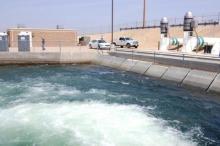Building evidence through hydrogeological survey and monitoring for the conjunctive development and management of water resources in Kunzila catchment area – Amhara Region, Ethiopia
Deploying a participatory approach for surveying the complex geohydrological system and defining the status of the groundwater resources in the Kunzila catchment area has crucial importance towards conjunctive use of its water and land resources for sustainable economic growth, social well-being, and environmental protection. Several initiatives are being undertaken to pilot the ‘Integrated Landscape Management and WASH’ project in this community to implement evidence-based approaches.
